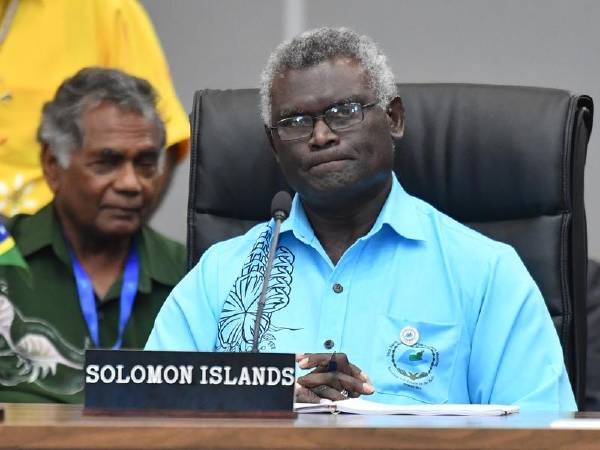The prime minister of Solomon Islands has accused the Australian government of hypocrisy over his country’s security deal with China, saying the Aukus pact was far from transparent but he “did not become theatrical and hysterical”.
Manasseh Sogavare said Solomon Islands and other countries in the region “should have been consulted to ensure that this Aukus treaty is transparent since it will affect the Pacific family by allowing nuclear submarines in Pacific waters”.
The Australian prime minister, Scott Morrison, hit back on Friday, suggesting that Sogavare had changed his view based on “other influences” and that there was a “remarkable similarity between those statements and those of the Chinese government”.
China announced last week that it had signed a security agreement with Solomon Islands, although the final terms of that deal are not yet public.
Australia, the UK and the U.S announced in mid-September they would deepen trilateral security cooperation through Aukus and launched a project to find the best way for Australia to acquire at least eight nuclear-propelled submarines.
The Australian foreign minister, Marise Payne, used a speech last Thursday to criticise the secrecy surrounding the Solomons security agreement while insisting “no document signed and kept away from public view” would change Australia’s commitment to answering Pacific island countries’ needs.
In an at-times defensive address to parliament in Honiara on Friday, Sogavare said the “western media” had accused Solomon Islands and China of showing a lack of transparency about the agreement. But Sogavare said he had first “learned of the Aukus treaty in the media”.
“One would expect that as a member of the Pacific family, Solomon Islands and members of the Pacific should have been consulted to ensure that this Aukus treaty is transparent, since it will affect the Pacific family by allowing nuclear submarines in Pacific waters,” Sogavare said.
“Oh, but I realise … that Australia is a sovereign country, and that it can enter into any treaty that it wants to, transparently or not – which is exactly what they did with [the] Aukus treaty.”
Sogavare added: “When Australia signed up to Aukus we did not become theatrical and hysterical on the implications this would have for us. We respected Australia’s decision. And I’m glad to say that Australia, United States of Australia and Japan respected our sovereignty to enter into this security agreement with China as well, based on trust and mutual respect.”
Morrison said had spoken with Sogavare the day after the Aukus announcement in September 2021, as part of a round of calls with many leaders briefing them on what had been negotiated in a “highly secure” environment.
Morrison said Australia had moved quickly to reassure the Pacific about Australia’s ongoing commitment to meet its nuclear non-proliferation obligations.
“I did have that conversation with the prime minister [Sogavare] the day following the announcement, and no issues were raised at that time in that discussion,” Morrison told reporters during an election campaign stop in Tasmania.
“But obviously, as time goes on and new relationships are entered into, there’s obviously been some clearly other influences in the perspective taken by the Solomon Islands prime minister. Now, I understand that.”
When a journalist asked whether Morrison was saying Sogavare was parroting China’s rhetoric, the Australian prime minister replied: “There’s a remarkable similarity between those statements and those of the Chinese government.”
China has been particularly critical of the Aukus agreement, seeing it as part of US efforts to contain it, and has emphasised nuclear non-proliferation risks.
A Chinese foreign ministry official, Wang Wenbin, told reporters on Wednesday that the U.S and Australia were guilty of “pure double standards”.
“The U.S shows no openness and transparency when it conducted nuclear tests and dumped nuclear wastes in the South Pacific region and when Aukus opened the Pandora’s box of nuclear proliferation in the Asia Pacific region,” Wang said.
Sogavare reiterated on Friday that Solomon Islands would not allow a Chinese military base in the country. He said he agreed with other leaders, including Morrison, that such a military base would not be in the interest of Solomon Islands or the region.
But Sogavare said he found it “very, very offensive” that Canberra had flatly denied it refused to allow Australian police and defence force personnel to protect Chinese-built infrastructure and the Chinese embassy during last year’s riots in Honiara.
He said Solomon Islands was left “with no option but to enter into security agreement with our other bilateral partners to plug the gaps that exist in our security agreement with Australia”.
“Solomon Islands is grateful for the security agreement that it has with Australia,” Sogavare said.
“However, the riots in 2006 and most recently the November riots have shown that even with Australia’s support we could not prevent half of Honiara from being razed to the ground.”
Sogavare said a stable Solomon Islands would lead to a stable Pacific and his country did not “subscribe to the view that only a partner or partners of the same ideology is able to do that”.
Last Thursday, a key adviser to the premier of the most populous province in Solomon Islands expressed concern that the deal could enable Sogavare to use Chinese armed police and military personnel to quash democratic dissent and hold power for years to come.
SOURCE: THE GUARDIAN/PACNEWS














